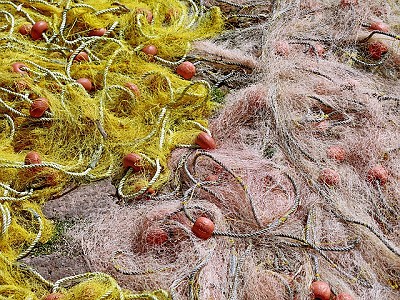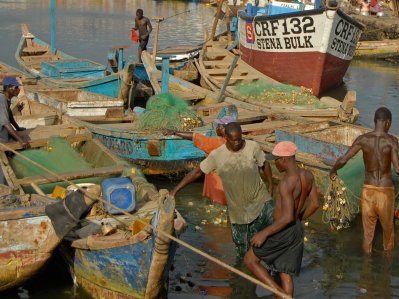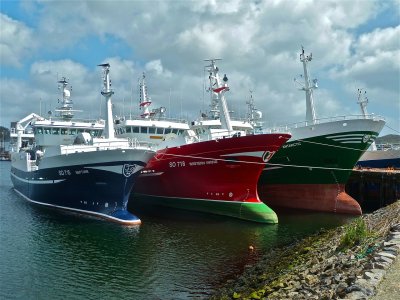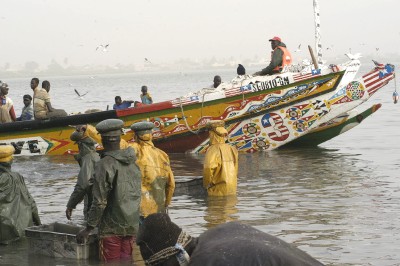 Highlights on the state of play in 2015 with particular attention to West Africa.
Highlights on the state of play in 2015 with particular attention to West Africa.
Mundus maris shares recent developments at the national and global level aimed at developing and introducing standardised processes and procedures that increase transparency in the fisheries sector. Transparency encompasses a trilogy that calls for participation, commitment and engagement of governmental, private sector and civil society representatives. The FiTI has meanwhile been expanded, but lots of issues await more robust resolution.
The purpose is to make accessible information, decisions, data, revenues and status of marine resources to the greater public in an understandable fashion. It is a means to combat corruption, to help decision makers at all levels to set appropriate recovery and management targets and to generally improve management and law enforcement. As a result, it is expected that transparency contributes to restoring marine living resources and their ecosystems to earlier more resilient and productive states. This goes hand in hand with a public better informed about the values, sustainable use and conservation of the common heritage of the oceans.
The notion of sustainable fisheries remains a global challenge. Advocated by science, politics, practitioners, campaigners, fishers and consumers it is a multi-faceted and multi-dimensional objective. The lack of transparency, weak governance and enforcement regimes at both, national and international scales, are considered as major reasons that prevent fisheries resources to be managed for sustainability.
Illegal, unreported and unregulated (IUU) fishing, overfishing and the marginalisation of the small-scale sector have led to increased international awareness of the need to improve transparency in fisheries governance.
 A number of international and national organisations have undertaken efforts to this end. Examples are the newly reformed European Union Fisheries Partnership Agreements (FPAs) based on the principle of sustainability. FPAs ensure total public transparency of EU operator activities in the areas fished. The EU global fishing transparency website provides useful information about the sector. In 2015 the Environmental Justice Foundation (EJF), Oceana and WWF made public data provided by the European Commission where users can search by vessel, flag state, year and type of agreement under the EU’s Fishing Authorisation Regulation (FAR) and which foreign vessels fish in EU waters.
A number of international and national organisations have undertaken efforts to this end. Examples are the newly reformed European Union Fisheries Partnership Agreements (FPAs) based on the principle of sustainability. FPAs ensure total public transparency of EU operator activities in the areas fished. The EU global fishing transparency website provides useful information about the sector. In 2015 the Environmental Justice Foundation (EJF), Oceana and WWF made public data provided by the European Commission where users can search by vessel, flag state, year and type of agreement under the EU’s Fishing Authorisation Regulation (FAR) and which foreign vessels fish in EU waters.
The FAO Code of Conduct for Responsible Fisheries (1995) is a baseline that has been complemented over the past 20 years. It includes instruments in the fight against IUU fishing, eco-labeling for certification, and guidelines on small-scale fisheries. The FAO Voluntary Guidelines for Securing Sustainable Small-Scale Fisheries in the Context of Food Security and Poverty Eradication (Rome, 2015) promote transparency as a guiding principle, e.g. ‘clearly defining and widely publicizing policies, laws and procedures in applicable languages, and widely publicizing decisions in applicable languages and in formats accessible to all’. These guidelines stipulate that ‘states should endeavor to prevent corruption, particularly through increasing transparency, holding decision-makers accountable, and ensuring that impartial decisions are delivered promptly and through appropriate participation and communication with small-scale fishing communities’.(11.3)
However, publicly available information or research on illegal financial flows related to corruption in the fishery sector and IUU is very limited. Despite the efforts undertaken by OECD, the UN and INTERPOL on related issues, initiatives to address corruption and even transnational organised crime in fisheries are relatively new.
The idea of developing a Transparency Initiative for Fisheries has been addressed during the last decade and due to the experiences made by the Extractive Industries Transparency Initiative (EITI).
EITI is organised as a non-profit international association under Norwegian law and was first launched in 2002 by UK Prime Minister Blair at the World Summit on Sustainable Development in Johannesburg. The organisation was founded in 2003 and managed under the UK Department for International Development. During the second EITI Conference in 2005, an international advisory group (IAG) chaired by Prof. Dr. Peter Eigen was established in order to further guide the work of how the EITI was to be set up and function. EITI defined a standard – subject to refinement and development – for addressing the levels of transparency around countries’ oil, gas and mineral resources. This standard is developed and overseen by a multi-stakeholder Board consisting of representatives from government, private sector and civil societies complemented by institutional investors and international organisations, and supported by the International Secretariat and the Members meeting. EITI is endorsed by the International Monetary Fund and the World Bank. Today, the EITI Standard is implemented in 48 countries (worth US$ 1.6 TR of government revenues from oil, gas and minerals disclosed). Of these, 31 are compliant with EITI requirements, endorsed by over 95 institutional investors and supported by around 90 companies involved in oil, gas, and mining. Criticism of EITI focuses on the lack of sanction possibilities, the co-option of civil society members, a credibility gap (Ethiopian membership), and non-recognition of human rights violations (Azerbaijan membership).
 The Fisheries Transparency Initiative (FiTI) as an initiative has been started by the president of the Islamic Republic of Mauritania, Mr. Mohamed Ould Abdel Aziz, in the framework of the Nouakchott Declaration on 20th January 2015. In March 2015 Mauritania’s Minister for Economy and Development (MAED) signed an MoU with the Humboldt Viadrina Governance Platform (HVGP) for transparency in the fishery sector represented by Prof. Dr. Peter Eigen, one of the HVGP’s founders. The HVGP is a non-profit limited liability company based in Berlin, Germany. Its overall objective is to strengthen the level of transparency, democratic participation of citizens and accountability of major actors. The MoU contains a conceptual definition of FiTI. The HVGP proposes a legal separation between EITI and FiTI. During the World Bank Spring Meetings (16.04.2015) the collaboration between the Government of Mauritania and the HVGP on the development of a conceptual global FiTI framework was confirmed. The development aims at the establishment of a trustworthy and internationally recognised FiTI standard. It should be achieved in close cooperation with an international FiTI advisory group and other relevant representatives during a first conceptual phase from 2015 to 2016. The FiTI standard should mainly include the principles and preconditions for transparency and process guidelines for the fishery sector.
The Fisheries Transparency Initiative (FiTI) as an initiative has been started by the president of the Islamic Republic of Mauritania, Mr. Mohamed Ould Abdel Aziz, in the framework of the Nouakchott Declaration on 20th January 2015. In March 2015 Mauritania’s Minister for Economy and Development (MAED) signed an MoU with the Humboldt Viadrina Governance Platform (HVGP) for transparency in the fishery sector represented by Prof. Dr. Peter Eigen, one of the HVGP’s founders. The HVGP is a non-profit limited liability company based in Berlin, Germany. Its overall objective is to strengthen the level of transparency, democratic participation of citizens and accountability of major actors. The MoU contains a conceptual definition of FiTI. The HVGP proposes a legal separation between EITI and FiTI. During the World Bank Spring Meetings (16.04.2015) the collaboration between the Government of Mauritania and the HVGP on the development of a conceptual global FiTI framework was confirmed. The development aims at the establishment of a trustworthy and internationally recognised FiTI standard. It should be achieved in close cooperation with an international FiTI advisory group and other relevant representatives during a first conceptual phase from 2015 to 2016. The FiTI standard should mainly include the principles and preconditions for transparency and process guidelines for the fishery sector.
This first conceptual phase should be followed by implementing FiTI in various interested countries. It is to be accompanied by an advisory group. Furthermore, an International Multi Stakeholder Board should be established. The global initiative should also be supported by an International Secretariat.
The first international advisory group meeting of the Fisheries Transparency Initiative took place in Berlin, Germany, on 24 July 2015. This meeting was supported by the Islamic Republic of Mauritania.
 The Fishery Transparency Initiative should play a significant role for improving fisheries governance and for maintaining marine resources as a source for global development and food security. It is a participative process carried forward by three stakeholder groups (representatives of government, private sector and civil society). Like with all such processes which go beyond the scope of established institutions based on democratic elections, the legitimacy of participants compared to those not participating needs to be established mostly through the quality and commitment of their work. On the other hand, such participative multi-stakeholder processes can lead to robust and widely acceptable approaches.
The Fishery Transparency Initiative should play a significant role for improving fisheries governance and for maintaining marine resources as a source for global development and food security. It is a participative process carried forward by three stakeholder groups (representatives of government, private sector and civil society). Like with all such processes which go beyond the scope of established institutions based on democratic elections, the legitimacy of participants compared to those not participating needs to be established mostly through the quality and commitment of their work. On the other hand, such participative multi-stakeholder processes can lead to robust and widely acceptable approaches.
This initiative uses the experience made in the framework of the Extractive Industries Transparency Initiative (EITI), while taking into account the specificities of the fishery sector. In particular, fisheries exploit renewable resources as compared to extractive industries. Mauritania became member of the global EITI process in 2005 and gained EITI conformity status in 2012. The next validation of its conformity status is due in 2016.
Interest to include fishery in the national Mauritanian EITI process have been expressed and pursued since 2011. The German technical cooperation organised and supported discussions and the preparation of assessments and seminars addressing the establishment of a fishery transparency initiative in Mauritania from 2011 to 2013. The EU launched a national discussion group on transparency in the context of preparations for the EU Fishery Partnership Agreement during 2014/15. In November 2011, the African Confederation of Professional Artisanal Fisheries Organizations (CAOPA) – of which Mauritanian representatives are members - hosted a regional seminar on the theme of Transparency in Marine Fisheries in Africa. During three days, 60 participants from a wide range of African organisations, including small-scale fisheries and coastal communities, discussed in detail the problems caused by the lack of transparency in the fisheries sector in order to develop strategies to improve public access to information. Emphasis was placed on the following challenges: fisheries licensing and authorisations, access agreements, penalties and fines, aid projects, and information on state of stocks, catch statistics and trade data.
 Today, we witness two developments that are somehow intertwined. First, efforts to develop and establish a global mechanism for fisheries transparency, which will be separated from, but mirror to some extent, the mechanisms and processes of EITI. The second development refers to the national level. Mauritania is the pilot country to pursue the build-up and establishment of a fisheries transparency mechanism at national level. It is hoped that this may be followed, if not adopted by other countries.
Today, we witness two developments that are somehow intertwined. First, efforts to develop and establish a global mechanism for fisheries transparency, which will be separated from, but mirror to some extent, the mechanisms and processes of EITI. The second development refers to the national level. Mauritania is the pilot country to pursue the build-up and establishment of a fisheries transparency mechanism at national level. It is hoped that this may be followed, if not adopted by other countries.
The legitimacy of both processes depends on whether the key actors in the different social groups “buy in”. In particular, a suitable form of e.g. Chinese and Corean, but also EU participation will be essential as their fleets operate globally in both legal and IUU settings. They will also face the challenge to include indicators that are generally accepted for sustainable management of marine resources, in particular fisheries. Moreover, disclosing ownership and financial flows in the fisheries sector, such as payments and revenues, is overdue compared to other sectors. Indicators need to include such transparency of financial flows, but also appropriate and feasible parameters to reflect whether management achieves rebuilding and exploitation at sustainable levels.
The biggest challenge of all will be compliance, a critical area where formal and informal mechanisms may come into play and where experiences in other sectors and areas should receive particular attention. Here, a global FiTI may be a necessary and appropriate mechanism.
Advantages of a national FiTI process are the increased public interest for the fisheries sector, support to combat IUU and corruption in order to increase legitimacy, revenues and wellbeing, and the provision of information that may help decision makers to improve fisheries management.
A successful global FiTI mechanism will prompt legally bound participation of all partners in the fisheries transparency process in committed countries. The process should be and remain open for anybody willing to “buy in”. Hence, other partners may join later or otherwise follow good examples. Validation of national processes performed by an international FiTI Secretariat is expected to increase legitimacy and help ensure quality of national processes in participating countries. It may be particularly useful in overcoming potential political impasse in national processes and offer more diverse collective learning grounds.
We're exploring the interest collaborating more on transparency issues for fisheries. Please contact This email address is being protected from spambots. You need JavaScript enabled to view it. if you would like to be part of the conversation or otherwise wish to make progress on this important challenge.
The facebook of FiTI page can be accessed here. Please engage actively! More information are available on the FiTI website.
For recent research results see the following publications:
Belhabib D, Sumaila UR, Lam VWY, Zeller D, Le Billon P, Abou Kane E, et al. (2015). Euros vs. Yuan: Comparing European and Chinese Fishing Access in West Africa. PLoS ONE 10(3): e0118351. https://doi.org/10.1371/journal.pone.0118351
Doumbouya A, Camara OT, Mamie J, Intchama JF, Jarra A, Ceesay S, Guèye A, Ndiaye D, Beibou E, Padilla A and Belhabib D (2017). Assessing the Effectiveness of Monitoring, Control and Surveillance of Illegal Fishing: The Case of West Africa. Frontiers in Marine Science, Vol. 4, Art. 50:10 p. https://doi.org/10.3389/fmars.2017.00050








